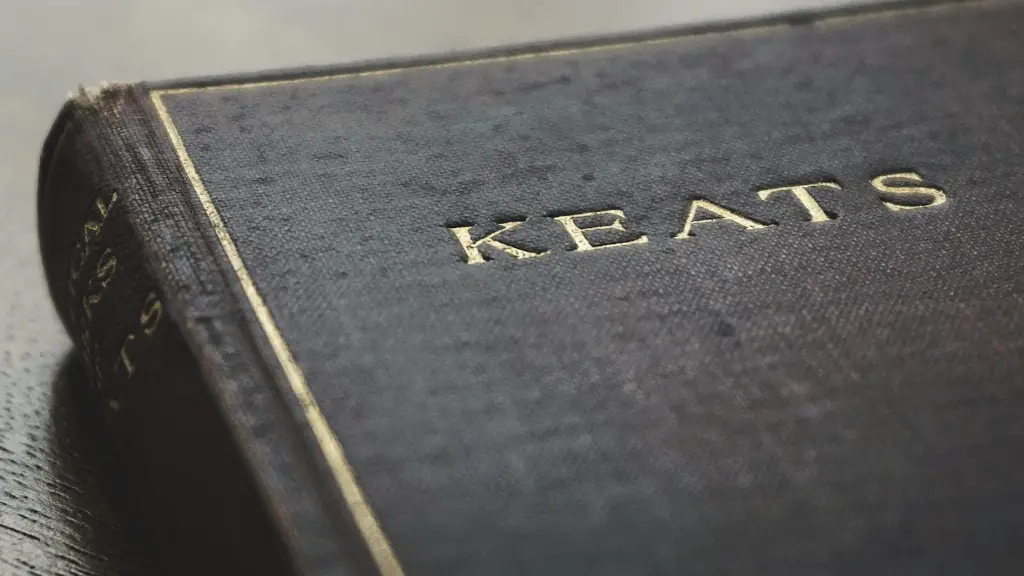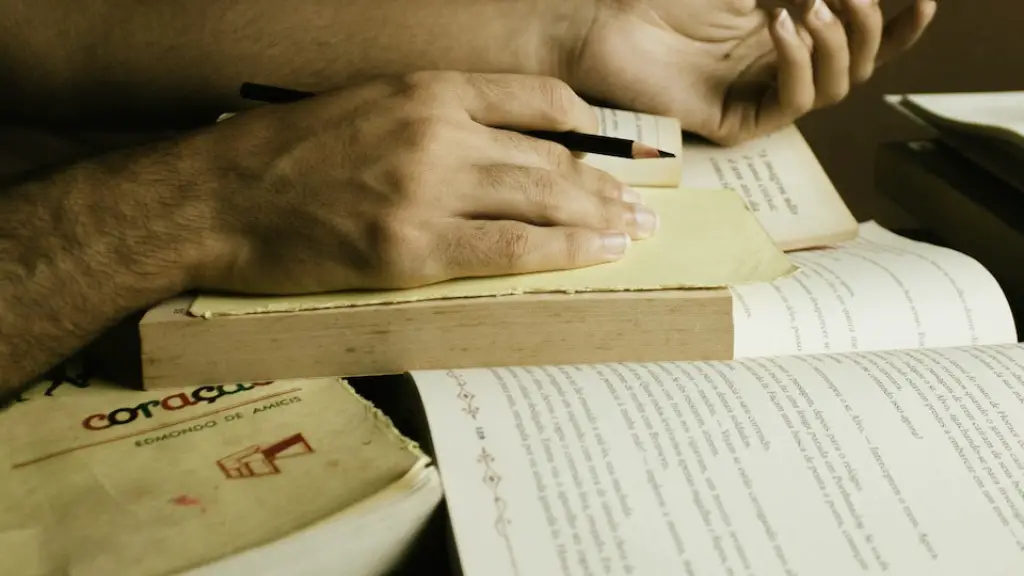A Late Walk by Robert Frost is a poem that places an emphasis on the physical aspects of the human experience. At its core, it is a poem about walking, but ultimately it speaks to the greater experience of being alive and how we understand and interpret the world as we do. Frost employs a range of poetic techniques and devices, as well as figurative language, in order to capture the visceral emotions associated with being in the moment and with the passing of time. Through the poem’s vivid imagery, Frost paints a lyrical picture of nature, conveying a powerful sense of nostalgia and of life’s fleeting moments.
The poem is structured in five quatrains, each consisting of four-line stanzas, and follows a fairly consistent rhythm, moving from the four-beat lines of iambic tetrameter to the three-beat lines of iambic trimeter. This rhythmic pattern, together with its rather simple vocabulary, is Frost’s decisive effort to capture a sort of poetic simplicity which does justice to the subject matter of the poem; that is, the beauty of nature and its delicately simple moments. Frost’s use of language and imagery contrasts the flux of nature and its setting with the stillness and constancy of the speaker’s wistful emotion, as he looks back on his life and meditates on time and its passing.
Frost employs a variety of poetic devices and techniques to convey his desired message of time’s fleetingness and the graceful beauty of nature. These include the use of alliteration and assonance, where recurring sounds are used to create a lyrical effect, and the use of personification, where abstract concepts such as time or the wind are presented in a human or physical form. Frost also makes use of anaphora, the repetition of phrases and words for emphasis, and paradox, which is the combination of two contradictory elements to create irony or tension. By combining all of these devices, Frost is able to create a vivid and evocative picture of the world that is both melodic and captivating.
The overriding theme of the poem is one of life’s fleeting moments and how we experience them. Frost invites the reader to take a walk with him, and to slow down in order to fully appreciate the beauty of the natural world. Time passes quickly, but if we embrace its passing, we can find beauty and joy in even the simplest moments. By allowing us to break away from the mundane and to observe the world as it really is, Frost reminds us of the transient beauty that exists all around us.
Throughout the poem, Frost touches upon the human condition and our uneasy relationship with time. He invites us to reflect on our lives and to appreciate the moments that pass us by, and to take pleasure in even the slightest of acts, such as a simple walk in the woods. Frost conveys a sense of grace and nostalgia through his use of imagery and poetic devices, and ultimately reminds us of the beauty of being alive.
A Late Walk by Robert Frost in Nature
Frost’s poem ‘A Late Walk’ presents nature in all its glorious beauty. He invites us to take a walk, to become fully immersed in the natural world and to notice the beauty of its nature. Frost paints a lyrical picture of nature and its setting, dynamically contrasting the flux of nature with the stillness and constancy of the speaker’s emotion. He celebrates the privileges we have as people, to be able to witness the beauty in the natural world. Frost urges us to experience the individual moments in nature as we walk, demonstrating how they are ephemeral and ever-changing.
Frost’s imagery brings to life all of the different components of nature; the grass, the trees and the moon. The vegetation is characterised as a peaceful haven and refuge, the trees take on a gentle, yet powerful stature and the moon is embraced in its bright and blissful radiance. Frost verbalises the brief moments in nature, providing us with the opportunity to stop and smell the roses and to value each second. His words are concise, vivid and timeless, encouraging us to see the beauty of nature for ourselves.
Frost conveys a vibrant appreciation of the natural world. He celebrates the privilege we have of being able to appreciate the simple moments in life, and reveals a strong sense of wonder and joy when tapping into the natural world. Frost succinctly reminds us that nature has so much beauty to offer, and that we should take the time to truly appreciate it. By purchasing into nature’s beauty and its temporal elements, Frost inspires us to pause and appreciate the present, allowing us to observe the beauty that exists all around us.
A Late Walk by Robert Frost as an Ode to Nature
Frost presents ‘A Late Walk’ as an ode to nature, taking the reader on a tranquil journey through nature’s wilderness. Frost displays the awe-inspiring beauty of nature in his use of personification and paradox, capturing the essence of the natural world and rendering it more vivid. He brings to life the wind, grass and trees, emphasising the true power of nature and its potential to bring us joy.
Frost’s poetic mastery allows us to slow down and experience nature in all its tranquillity and serenity, demonstrating the existence of beauty beyond our everyday life. He transports us to a gentle and idyllic world of nature, where the peacefulness can offer solace and provide a much needed escape. The significance of this is not to be underestimated; taking the time to silently appreciate nature can have a markedly positive effect on our wellbeing and mental health.
The beauty of nature is limitless, and Frost captures this in his poem. By displaying the potential of the mortal world, Frost reaches out to us and imparts how it can both inspire and rejuvenate us, if only we can just take the time to open our eyes and observe the wonders of the natural world. In his poetic diction, Frost’s words form a resounding reminder of the beauty and joy of being alive, and to never take for granted the beauty of life itself.
A Late Walk by Robert Frost as a Reflection of Nostalgia
The poem ‘A Late Walk’ contains a powerful sense of nostalgia and remorse, an emotion that Frost uses to encourage us to reflect on our lives and to treasure the fleeting moments that nature has to offer. Frost maintains an evocative tone throughout the poem, emphasising the movement of time and urging the reader to savour its pleasantness.
Frost presents a yearning for the melancholia of past memories, highlighting the beauty that can be found in each passing moment. He conjures a powerful nostalgia, demonstrating the privilege we have of watching each moment as it passes by, and to savour the simple beauty of everyday life. He urges us to embrace the movement and beauty of life, and to cherish its passing.
Frost’s words reach out to us, encouraging us to take in the beauty of passing moments and to embrace their passing. With this, he reveals how each passing moment can both inspire us and leave an everlasting imprint on our lives, should we just take the time to open our eyes and truly notice it. By reaching out to us, Frost demonstrates the potential that each moment holds, and serves as a resonating reminder of the beauty and poignancy of life itself.
A Late Walk by Robert Frost as a Reminder of Death
At its core, the poem ‘A Late Walk’ serves as a reminder of death and the passing of time. While Frost mainly focuses on the beauty of the natural world, he displays the inevitability of death, and the need to appreciate the moments that make up life. He relentlessly draws us away from our mundane world and immerses us in the raw and untainted beauty of the natural world, in an attempt to encourage us to savour life’s passing moments.
Frost’s poem serves as a gentle reminder of the finality of life. He reminds us that our lives are finite, and by taking the time to savour passing moments we can connect with nature and properly appreciate the beauty of life. He fiercely urges us to trust in the passing moments and to treasure them, despite the guidance of mortality.
Frost’s poem offers us a solemn reminder of the frailty of life, and the importance of preserving its passing moments. He encourages us to open our eyes and to recognise the beauty that exist in the everyday moments, and further, to savour each passing moment, in order to enhance our lives and the lives of those around us.




